Related Research Articles

Garrett Augustus Morgan Sr. was an American inventor, businessman, and community leader. His most notable inventions were a type of three-way traffic light, and a protective 'smoke hood' notably used in a 1916 tunnel construction disaster rescue. Morgan also discovered and developed a chemical hair-processing and straightening solution. He created a successful company called "G. A. Morgan Hair Refining Company" based on his hair product inventions along with a complete line of haircare products and became involved in the civic and political advancement of African Americans, especially in and around Cleveland, Ohio.
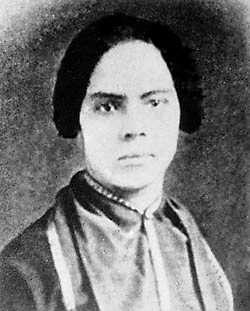
Mary Ann Camberton Shadd Cary was an American-Canadian anti-slavery activist, journalist, publisher, teacher, and lawyer. She was the first black woman publisher in North America and the first woman publisher in Canada. She was also the second black woman to attend law school in the United States. Mary Shadd established the newspaper Provincial Freeman in 1853, which was published weekly in southern Ontario. it advocated equality, integration, and self-education for black people in Canada and the United States.

The Great Migration, sometimes known as the Great Northward Migration or the Black Migration, was the movement of six million African Americans out of the rural Southern United States to the urban Northeast, Midwest, and West between 1910 and 1970. It was substantially caused by poor economic and social conditions due to prevalent racial segregation and discrimination in the Southern states where Jim Crow laws were upheld. In particular, continued lynchings motivated a portion of the migrants, as African Americans searched for social reprieve. The historic change brought by the migration was amplified because the migrants, for the most part, moved to the then-largest cities in the United States at a time when those cities had a central cultural, social, political, and economic influence over the United States; there, African Americans established culturally influential communities of their own. According to Isabel Wilkerson, despite the loss of leaving their homes in the South, and the barriers faced by the migrants in their new homes, the migration was an act of individual and collective agency, which changed the course of American history, a "declaration of independence" written by their actions.

Frances Ellen Watkins Harper was an American abolitionist, suffragist, poet, temperance activist, teacher, public speaker, and writer. Beginning in 1845, she was one of the first African American women to be published in the United States.

Ida Bell Wells-Barnett was an American investigative journalist, sociologist, educator, and early leader in the civil rights movement. She was one of the founders of the National Association for the Advancement of Colored People (NAACP). Wells dedicated her career to combating prejudice and violence, and advocating for African-American equality—especially that of women.

Karamu House in the Fairfax neighborhood on the east side of Cleveland, Ohio, United States, is the oldest producing Black Theatre in the United States opening in 1915. Many of Langston Hughes's plays were developed and premiered at the theater.

African American newspapers are news publications in the United States serving African American communities. Samuel Cornish and John Brown Russwurm started the first African American periodical, Freedom's Journal, in 1827. During the Antebellum South, other African American newspapers sprang up, such as The North Star, founded in 1847 by Frederick Douglass.

Okechukwu "Okey" Ndibe is a novelist, political columnist, and essayist of Igbo ethnicity. Ndibe was born in Yola, the capital city of Adamawa State, north-eastern Nigeria. He is the author of Arrows of Rain and Foreign Gods, Inc., two critically acclaimed novels published in 2000 and 2014 respectively.

The New Orleans Tribune / La Tribune de la Nouvelle-Orléans was a newspaper serving the African-American community of New Orleans, Louisiana. It was the first Black daily newspaper in the United States.
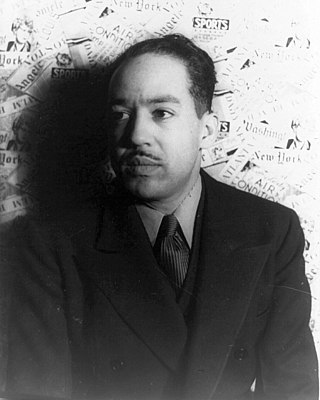
James Mercer Langston Hughes was an American poet, social activist, novelist, playwright, and columnist from Joplin, Missouri. One of the earliest innovators of the literary art form called jazz poetry, Hughes is best known as a leader of the Harlem Renaissance. He famously wrote about the period that "the Negro was in vogue", which was later paraphrased as "when Harlem was in vogue."

The Cleveland Gazette was a weekly newspaper published in Cleveland from August 25, 1883, to May 20, 1945. It was an African American newspaper owned and edited by Harry Clay Smith, initially with a group of partners. Circulation was estimated between 5,000 and 18,000.

On October 16, 1901, shortly after moving into the White House, President Theodore Roosevelt invited his adviser, the African American spokesman Booker T. Washington, to dine with him and his family. The event provoked an outpouring of condemnation from white politicians and press in the American South. This reaction affected subsequent White House practice and no other African American was invited to dinner for almost thirty years.
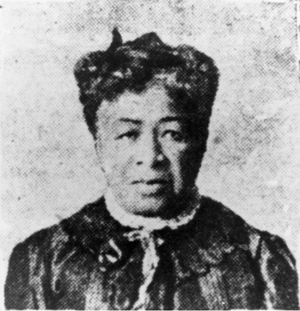
Lucy Stanton Day Sessions was an American abolitionist and feminist figure, notable for being the first African-American woman to complete a four-year course of a study at a college or university. She completed a Ladies Literary Course from Oberlin College in 1850.
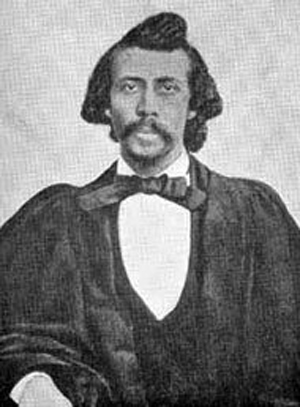
William Howard Day was a black abolitionist, editor, educator and minister. After his father died when he was four, Day went to live with J. P. Williston and his wife who ensured that he received a good education and learned the printer's trade. He received his bachelor's and master's degree from Oberlin College. He was a printer and newspaper editor. He fought for civil rights of African Americans a number of ways, as a journalist, teacher, and leader of the Freedmen's Bureau. He was an orator, making a speech to 10,000 newly emancipated people on what biographer Todd Mealy called the first march on Washington.
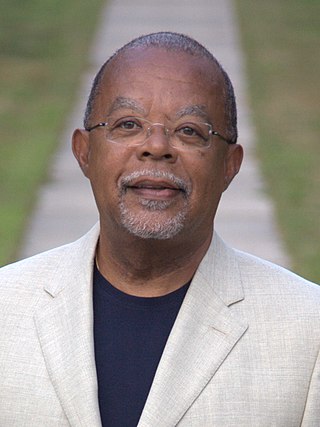
Henry Louis Gates Jr. is an American literary critic, professor, historian, and filmmaker who serves as the Alphonse Fletcher University Professor and the director of the Hutchins Center for African and African American Research at Harvard University. He is a trustee of the Gilder Lehrman Institute of American History. He rediscovered the earliest known African-American novels and has published extensively on the recognition of African-American literature as part of the Western canon.
The Call and Post is an African-American weekly newspaper, based in Cleveland, Ohio and is owned by world famous boxing promoter Don King.
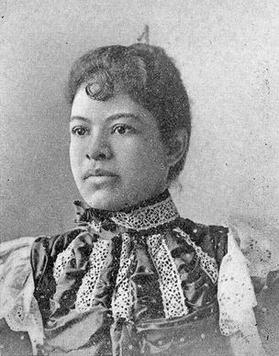
Ida Gray was the first African-American woman to become a dentist in the United States.

Freedom was a monthly newspaper focused on African-American issues published from 1950 to 1955. The publication was associated primarily with the internationally renowned singer, actor and then officially disfavored activist Paul Robeson, whose column, with his photograph, ran on most of its front pages. Freedom's motto was: "Where one is enslaved, all are in chains!" The newspaper has been described as "the most visible African American Left cultural institution during the early 1950s." In another characterization, "Freedom paper was basically an attempt by a small group of black activists, most of them Communists, to provide Robeson with a base in Harlem and a means of reaching his public... The paper offered more coverage of the labor movement than nearly any other publication, particularly of the left-led unions that were expelled from the CIO in the late 1940s... [It] encouraged its African American readership to identify its struggles with anti-colonial movements in Africa, Asia, and the Caribbean. Freedom gave extensive publicity to... the struggle against apartheid."
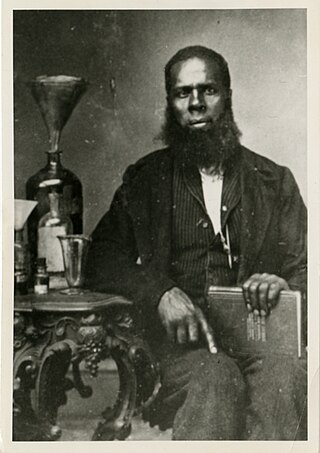
Joshua McCarter Simpson was a store proprietor, herbalist, poet and lyricist in the United States. He lamented the enslavement of African Americans, called out the hypocrisy of white Christian abusers, and denounced the brutal treatment and discrimination African Americans received. His songs were published in 1854 as The Emancipation Car: Being an Original Composition of Anti-Slavery Ballads, Composed Exclusively for the Underground Railroad. His work was well known and widely circulated during his lifetime. Alternative first (John) and last names (McCarty) have been noted.
References
- ↑ "Aliened American". Encyclopedia of Cleveland History. Case Western Reserve University. 2018-05-11. Retrieved 2021-04-13.
- ↑ Allen, Danielle; Somanathan, Rohini (2020). Difference Without Domination: Pursuing Justice in Diverse Democracies. University of Chicago Press. ISBN 978-0-226-68122-1.
- ↑ Sandler, Matt (2020). The Black Romantic Revolution: Abolitionist Poets at the End of Slavery. Verso Books. ISBN 978-1-78873-544-5.